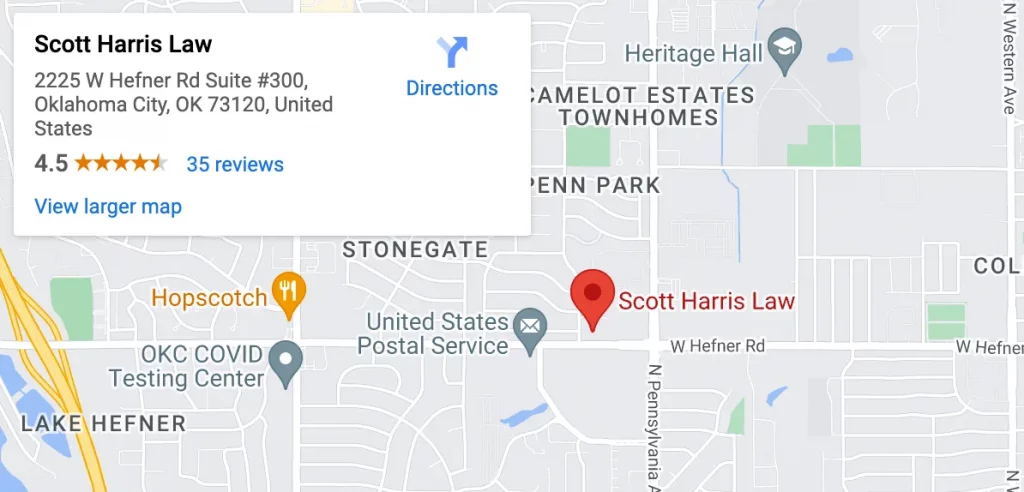Relieve Yourself From The Stress of Wage Garnishment
It can be stressful if money is being taken from your paycheck because of debts, like taxes or child support. But knowing your rights is crucial.
A wage garnishment attorney can help you figure out if there are ways to stop or lessen the amount taken from your pay. That means you might get more of the money you worked hard for.
Quick Summary:
- Wage garnishment occurs when an employer withholds a part of an employee’s paycheck to pay off debts and is court-ordered.
- The three main types of wage garnishment are creditor garnishments, tax levies, and child support or alimony garnishments.
- Oklahoma has specific laws on wage garnishments. One allows creditors to collect up to 25% of a person’s disposable earnings for that week.
- To oppose a wage garnishment, individuals should review court documents. Then, they should follow the instructions on how to object.
- Alternatives to wage garnishment include bankruptcy, debt consolidation, negotiation, and attending a creditors’ hearing. One can also respond to the creditor’s letter.
What is Wage Garnishment?
Wage garnishment is a legal process wherein an employer withholds a part of an individual’s earnings to pay off debts. Garnishment happens when someone owes money to creditors, the government, or other entities. It is a last resort when other attempts to collect the debt have failed.
What are the Types of Wage Garnishment?
There are several types of wage garnishments, each with its own rules and regulations:
- Creditor Garnishment: A creditor obtains a court order to garnish wages for unpaid debts, such as credit card bills, medical bills, or personal loans.
- Child Support Garnishment: Court-ordered garnishment to enforce child support payments from a non-custodial parent’s wages.
- Tax Garnishment: The government can garnish wages to collect unpaid taxes, including federal, state, or local taxes.
- Student Loan Garnishment: The government can also garnish wages to collect unpaid student loans, including federal student loans and sometimes private student loans.
Who Can Garnish Wages in Oklahoma?
In Oklahoma, specific organizations can take money from your paycheck if you owe them money. They are the following:
- Creditors: These are people or businesses you owe money to. They can get a court order to take money directly from your paycheck if you do not pay them back.
- Government Agencies: The Internal Revenue Service (IRS) or the Oklahoma Tax Commission can take money from your paycheck if you owe taxes or other government debts, like child support or student loans.
- Child Support Agencies: If you are behind on child support payments, the Department of Homeland Security (DHS ) or Office of Child Support Services (OCSS) can get a court order to take money from your paycheck to ensure you pay on time.
- Student Loan Providers: If you do not pay back your federal student loans, the Department of Education or a private student loan company can get a court order to take money from your paycheck until you have paid off your debt.
What is Oklahoma’s Law Regarding Wage Garnishment?
Wage garnishment laws in Oklahoma dictate how much an employee’s earnings can be withheld to satisfy debts. The state allows creditors to garnish up to 25% of a person’s disposable income.
Oklahoma also garnishes the amount that their weekly income exceeds 30 times the federal minimum wage. Certain types of income, such as Social Security benefits, are protected from garnishment under Oklahoma law.
What is Oklahoma’s Wage Garnishment Process?
Below is an overview of the wage garnishment process in Oklahoma:
- The creditor gets approval: First, the creditor (the person or company you owe money to) must obtain permission from the court to take money from your paycheck.
- You get a warning: Once the court approves it, you will receive a notice from the creditor saying they will take money from your paycheck.
- You can object: If you think they should not take money from your paycheck, you can argue your case in court.
- Court gives the go-ahead: If you do not object or if the court disagrees with you, the creditor can tell your employer to take money from your paycheck.
- Your employer is notified: Your employer will get a notice from the creditor. They will tell your employer to take out some of your paycheck and send it to them.
- Money goes to the creditor: Your employer will send the money to the creditor until your debt is paid off or until the court says to stop.
- When it ends: This wage garnishment continues until you have paid off what you owe or until the court says it is over. That could happen if you win your objection, declare bankruptcy, or if the creditor decides to stop.
Debtors in Oklahoma need to understand their rights and options when facing wage garnishment, including the possibility of filing for exemptions or seeking legal help.
What is the Process of Opposing Wage Garnishment?
When you receive a notice of garnishment, the first step in objecting to it is to prepare and file paperwork. This paperwork will typically come with the garnishment documents from the court and will include instructions on how to proceed.
These instructions will cover critical details, such as:
- The deadline by which you must file your objection
- Whether your objection must be submitted in writing
- Whether you need to use a form provided by the court or draft your written objection
- The specific information that your written objection should contain
- Where you should file your objection
- Whether you need to serve a copy of your objection on the judgment creditor and any other involved parties
- The date, time, and location of any hearing that the court will hold to consider your objection
If the garnishment documents you received do not include this information, contact the court clerk immediately to obtain it.
What are the Alternatives to Wage Garnishment?
Wage garnishment can be a stressful experience, but there are alternatives available. Some options include negotiating a payment plan with your creditor, filing for bankruptcy, or seeking legal guidance from a wage garnishment attorney. Understanding your rights and options before taking any action is necessary.
- Bankruptcy: This is a serious decision where you declare you cannot pay your debts.
- Debt Counseling: A professional helps you plan to manage your debts and negotiate with creditors.
- Attending an Objection Hearing: You can go to a hearing to explain your situation and try to negotiate a different repayment plan.
- Responding to Creditor Letters: When you get a letter from a creditor, reply quickly and politely. Offer to work out a repayment plan.
Get Help With Wage Garnishment Woes Now!
Are you facing wage garnishment in Oklahoma? Do not worry. We are here to help! At Scott Harris Law, PLLC, our wage garnishment attorney understands the stress and financial strain it can cause.
Our wage garnishment attorney can assist you in preventing your wages from being seized by creditors. We will check each client’s financial circumstances and develop tailored strategies to stop or minimize wage garnishments. Through legal advocacy and negotiation, we support clients in alleviating financial strains.
Our attorney also helps with other issues, like bankruptcy, credit card debt, and foreclosure defense. Let us fight for your rights and provide you with the needed legal support. Talk to our wage garnishment lawyer right this moment!




